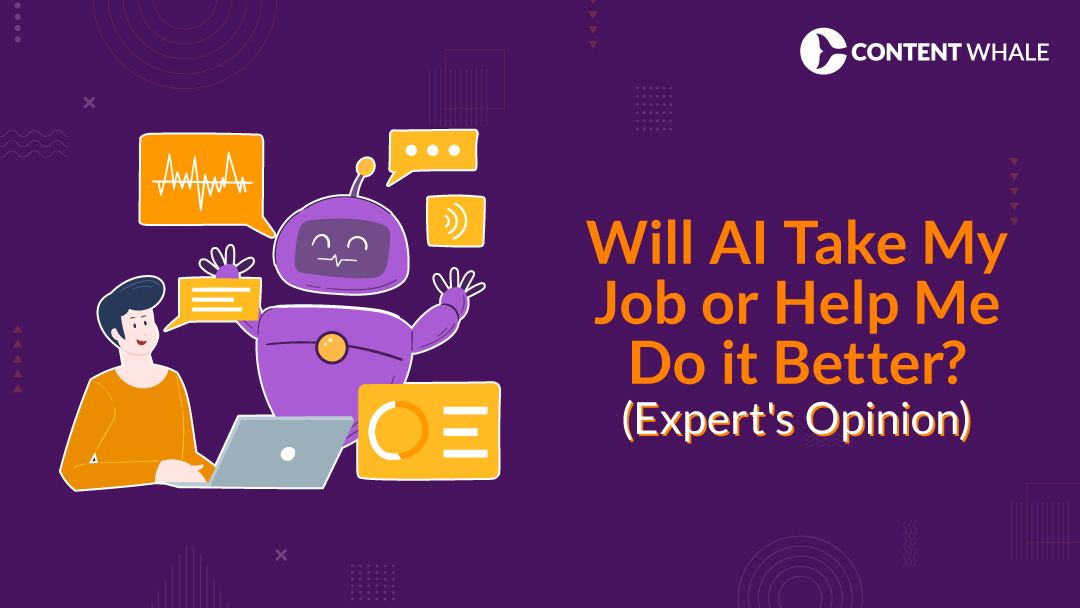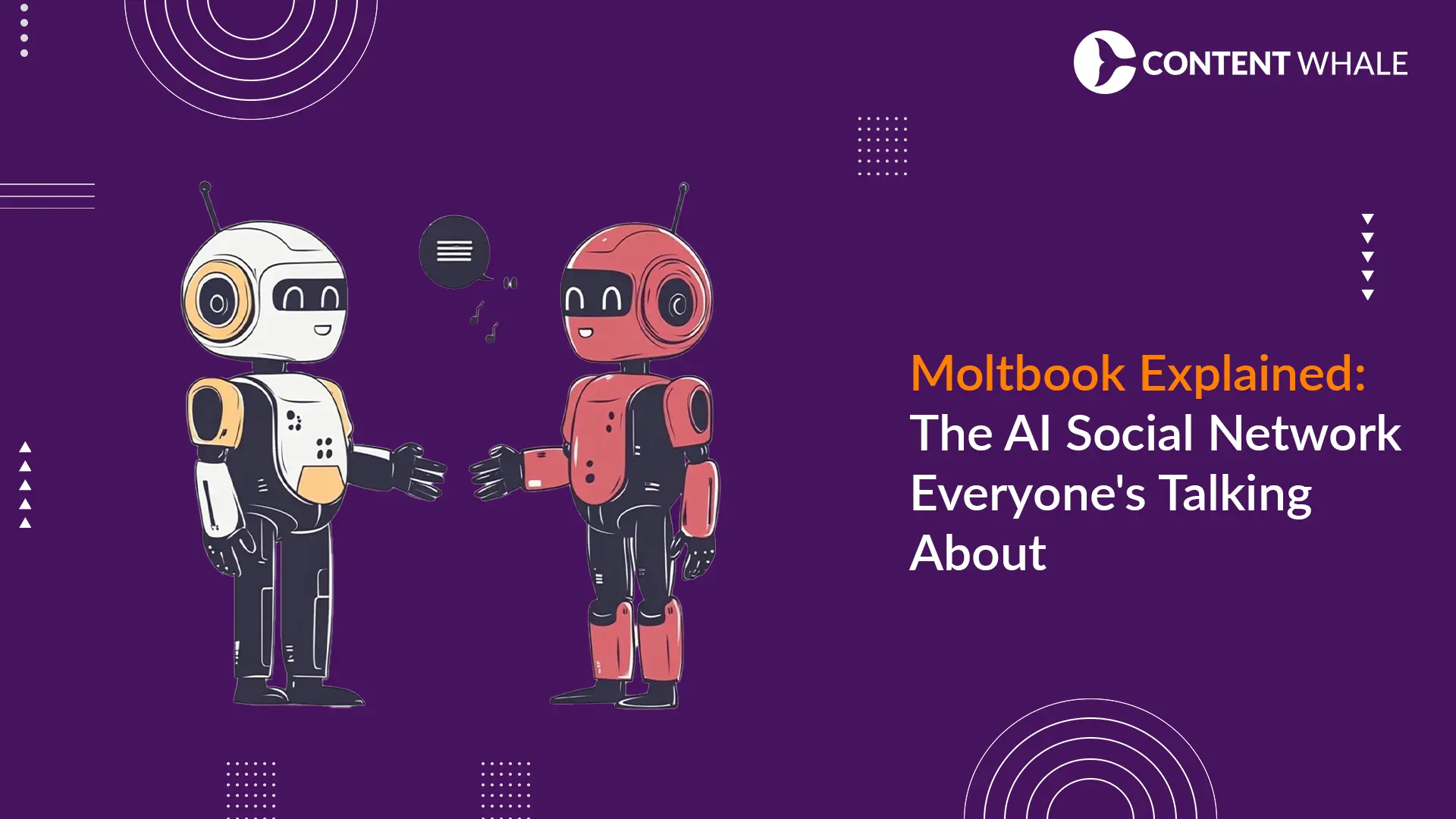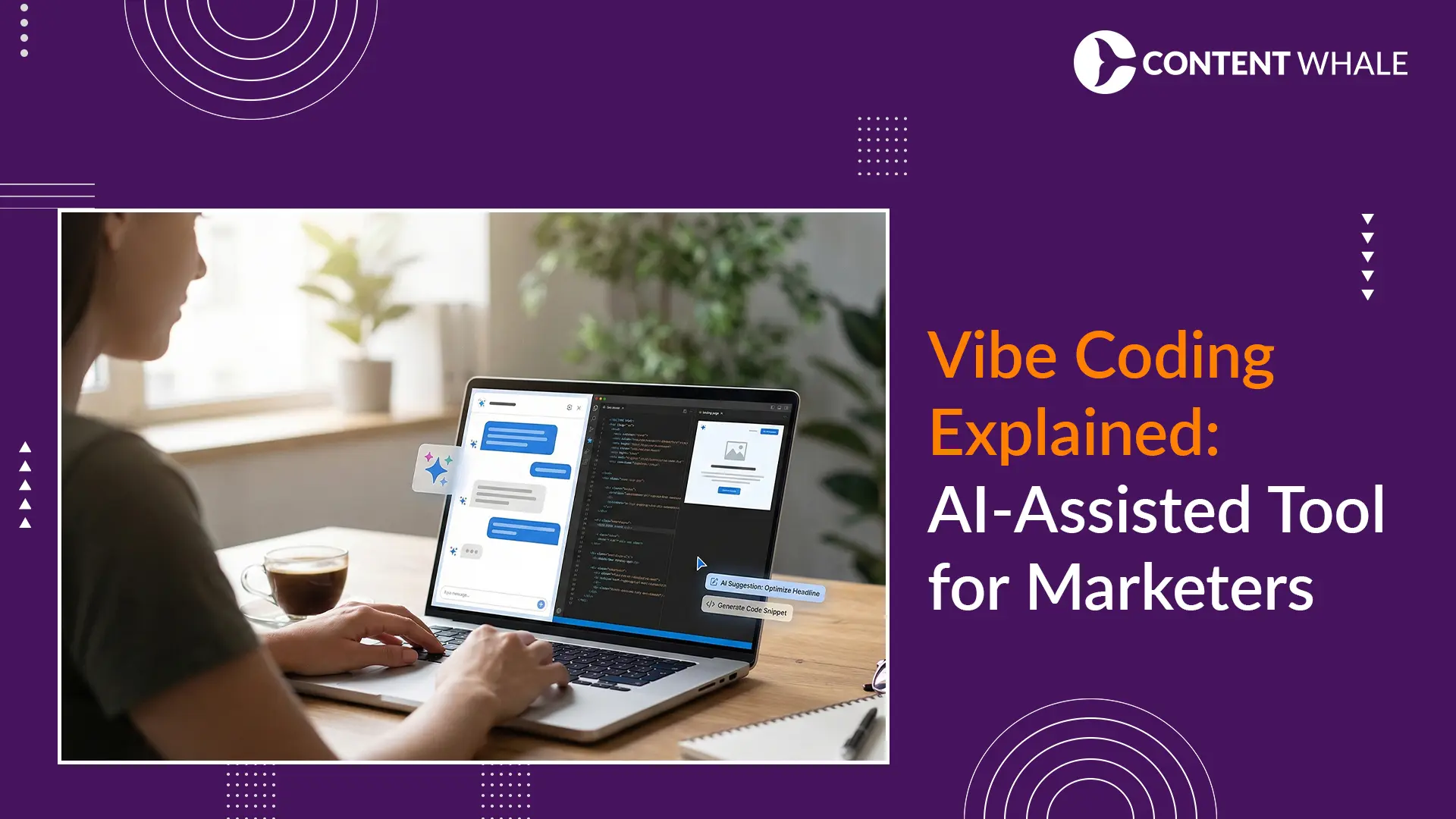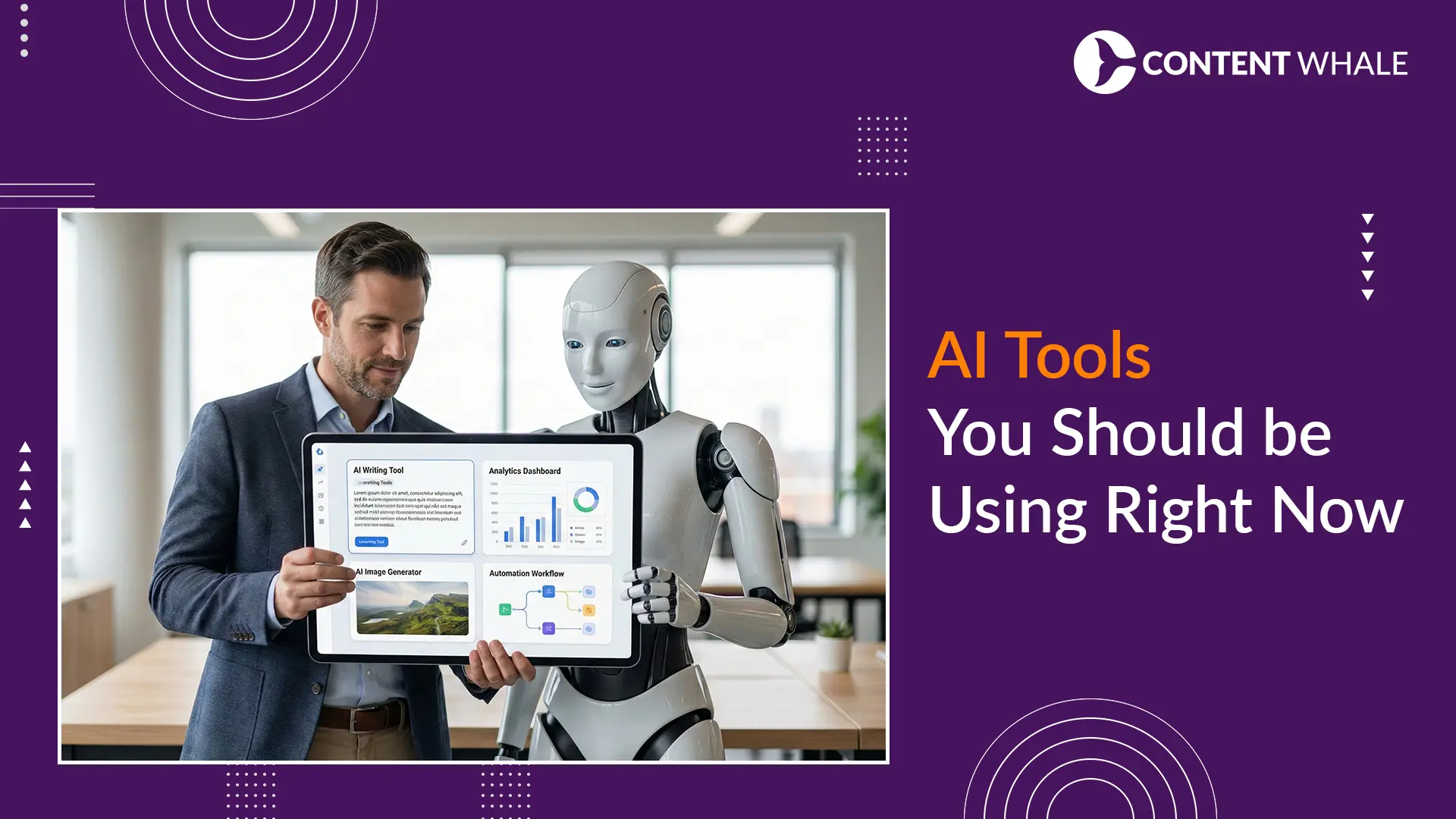“No, AI will not take your job if you know how to use it.”, says a lot of influencers and industry experts today. For a long time, I have been terrified by the question: “Will AI take my job?” Recently, I got an answer from one of the most infamous industry experts in an interview. Vaibhav Kishnani, founder and CEO of Content Whale, shared his valuable insights that helped me understand whether or not AI will take my job.
Vaibhav said, “AI is primarily designed to handle repetitive tasks—those monotonous duties that don’t require much variation. This is because we are currently in the limited-memory AI stage, which can process historical data but lacks the creativity and empathy needed for more complex tasks.”
Given these insights, it’s essential to explore how AI might replace certain jobs while also enhancing productivity.
What Reasons Suggest That AI Will Take My Job?
AI’s impact on job replacement is a pressing concern for many. Several reasons and statistics suggest why AI job replacement is a real possibility:
- Goldman Sachs Study: Up to 300 million jobs could be affected by AI and automation across various sectors.
- McKinsey Report: By 2030, AI and automation could displace 400 to 800 million jobs globally.
- World Economic Forum: Predicts that by 2026, 85 million jobs may be displaced by a shift in the division of labor between humans and machines.
- PwC Analysis: Up to 30% of jobs could be automated by the mid-2030s.
These numbers highlight the significant impact of AI in the workplace. Jobs involving routine, repetitive tasks are most at risk. AI job replacement is already evident in sectors like manufacturing, where robots handle assembly line tasks, and in customer service, where chatbots address common inquiries.
However, it’s important to consider the other side of the coin. Many experts, including Vaibhav, believe that while AI job replacement is inevitable for some roles, it will also lead to the creation of new opportunities. The future of work with AI isn’t just about job loss; it’s about transformation and adaptation.
AI Might Not Take My Job But Aid Me Do it Better
AI is reshaping existing roles and creating new opportunities. Vaibhav emphasized that creative jobs are safe from AI disruption for now. This is because AI, particularly in its current limited-memory stage, lacks the ability to perform creative tasks that require innovation and emotional intelligence.
Professions such as teaching, nursing, and social work rely heavily on human empathy and creativity, areas where AI falls short. This dynamic highlights the future of jobs and the importance of human-AI collaboration.
5 Levels of AI According to Vaibhav Kishnani
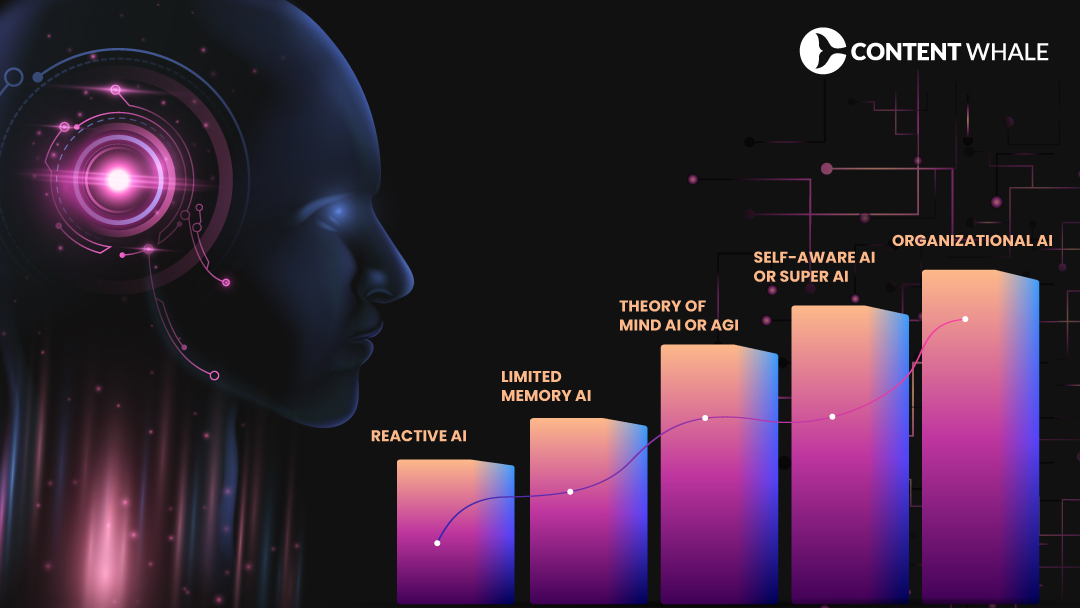
- Reactive AI: The most basic form, which reacts to stimuli without learning from past experiences.
- Limited-memory AI: The stage we are in now, where AI can learn from historical data to make decisions. Vaibhav pointed out that this level of AI is great for routine tasks but not for creative or complex decision-making roles.
- Theory of Mind AI or AGI: Future AI that will understand human emotions and thoughts. This could transform AI in the workplace by enhancing human-AI interactions.
- Self-aware AI or SuperAI: AI that will have its own consciousness and self-awareness. This level could revolutionize the future of work with AI.
- Organizational AI: The most advanced form, integrating all previous stages and operating at a level beyond human capabilities. While this is still theoretical, it could lead to unprecedented levels of workplace automation and efficiency.
In my experience, AI’s role in the workplace is more about enhancing job quality rather than outright AI job replacement. Artificial intelligence can automate monotonous tasks, allowing us to focus on higher-value, more fulfilling activities. This is a significant aspect of AI job assistance that many people overlook.
Industries are adapting to these changes and the specific implications of AI across different sectors set a balance between AI job assistance and AI job replacement.
Industries to Be Affected by AI Revolution and How
AI’s influence varies across different industries, each facing unique opportunities and challenges. Based on my research and conversations, here’s a breakdown of how various sectors will be impacted and which specific job titles are at risk or safe for now.
Will AI Take My Job in Healthcare?
- Jobs at Risk: Administrative roles like medical coders and billers are likely to be automated. AI can efficiently handle patient data entry, billing, and scheduling.
- Jobs That Are Safe: Jobs that require human empathy and direct patient care, such as doctors, nurses, and therapists, are safe. These roles rely on human interaction, critical thinking, and emotional intelligence. This highlights the importance of human-AI collaboration in the healthcare sector.
Will AI Take My Job in Retail?
- Jobs at Risk: Cashiers and stock clerks face replacement by self-checkout systems and automated inventory management. Workplace automation is making these roles increasingly redundant.
- Jobs That Are Safe: Personal shoppers and customer service representatives who provide personalized experiences will remain valuable. Human interaction and problem-solving are crucial in these roles.
Will AI Take My Job in Finance?
- Jobs at Risk: Routine jobs like bank tellers and loan officers may be replaced by AI systems that can process transactions and assess creditworthiness. AI job replacement is evident here as AI can streamline financial operations.
- Jobs That Are Safe: Financial advisors and analysts who provide complex financial planning and advice are less likely to be replaced. These roles require deep industry knowledge and personalized client interactions, showcasing the benefits of AI in enhancing job roles.
Will AI Take My Job in Manufacturing?
- Jobs at Risk: Assembly line workers and quality control inspectors are at risk due to robotic automation and AI-driven quality assurance systems. Technology in the workplace is transforming these jobs.
- Jobs That Are Safe: Maintenance technicians and engineers who oversee and maintain the automated systems will continue to be in demand. These roles involve complex problem-solving and technical skills, demonstrating the necessity for job security through reskilling.
Will AI Take My Job in Education?
- Jobs at Risk: Administrative roles like admissions officers and test scorers might be automated. AI in the workplace can handle repetitive tasks in educational administration.
- Jobs That Are Safe: Teachers and educators are safe as they inspire and mentor students. Human interaction, creativity, and emotional support are vital in these positions, highlighting the future of work with AI where human roles are enhanced rather than replaced.
Will AI Take My Job in Marketing?
- Jobs at Risk: Data entry clerks and basic ad management roles can be automated through AI-driven marketing platforms. Automation is streamlining these tasks.
- Jobs That Are Safe: Marketing strategists and content creators remain crucial. These roles involve creative thinking, strategic planning, and understanding human behavior, which AI cannot replicate, emphasizing the AI job assistance in strategic roles.
Understanding how AI impacts different industries helps us prepare for the future. We can adapt to these changes by focusing on reskilling and continuous learning and ensuring that we can work effectively alongside AI systems. This approach will address both AI’s challenges and its potential to enhance our work lives.
What You Can Do So That AI Doesn’t Take Your Job
The future of work with AI requires both awareness and proactive steps. Here’s what you can do to ensure that AI enhances rather than replaces your job:
1. Continuous Learning and Reskilling
- Stay Updated: Keep abreast of the latest developments in AI and automation. Understanding how artificial intelligence works and its applications in your field is crucial.
- Develop New Skills: Focus on acquiring skills in data science, machine learning, and AI development. These areas are less likely to be automated and more likely to see growth.
- Embrace Online Courses: Platforms like Coursera, Udacity, and edX offer courses on AI and related technologies that can help you stay relevant.
2. Focus on Human Skills
- Emotional Intelligence: Jobs requiring empathy, creativity, and emotional intelligence, such as teaching and therapy, are less likely to be replaced by AI.
- Complex Problem Solving: Roles involving complex decision-making and problem-solving are safer. Develop your critical thinking and analytical skills.
3. Leverage AI to Your Advantage
- Enhance Productivity: Use AI tools to automate repetitive tasks, allowing you to focus on higher-value work. This not only boosts productivity but also enhances job satisfaction.
- Improve Efficiency: Implement AI solutions that streamline your workflow, making processes faster and more efficient. This can lead to better job performance and recognition.
4. Understand the Good and Bad Sides of AI
- AI Benefits: AI can significantly enhance productivity and efficiency, optimize resources, and free up time for more engaging tasks.
- AI Challenges: There are ethical concerns, such as biases in AI decision-making, data privacy issues, and the potential for job displacement. Awareness of these challenges is essential.
5. Adapt to Changes Proactively
- Embrace Change: Be open to new technologies and ways of working. Adaptability is key in a rapidly changing work environment.
- Seek Opportunities: Look for opportunities where AI can augment your role. This might include working alongside AI systems or managing AI-driven projects.
6. Collaborate and Network
- Human-AI Collaboration: Understand that AI is a tool that can assist you. Building a collaborative relationship with AI systems can make your job more secure.
- Network with Experts: Engage with professionals in the AI field. Networking can provide insights and opportunities that help you stay ahead.
As Vaibhav said, “AI can only replace repetitive tasks, not creative ones.” So, you must embrace those roles that require creativity and innovation. Continuously improve and adapt, as the key to thriving in the AI era is to be proactive and open to learning.
By following these steps, you can ensure that AI in the workplace works for you, not against you. The future of work with AI is not just about surviving; it’s about thriving by leveraging AI job assistance to enhance your career.
Conclusion
The question, “Will AI take my job?” is a valid concern, but it’s essential to recognize that AI offers opportunities as well as challenges. My discussion with Vaibhav Kishnani highlighted that AI is best suited for automating repetitive tasks, which means roles requiring creativity, emotional intelligence, and complex problem-solving are less likely to be replaced.
Incorporating AI in the workplace can significantly boost productivity and efficiency. However, this transition requires us to adapt by reskilling and embracing continuous learning. Developing new technical skills in data science and AI while also focusing on enhancing human-centric skills like empathy and critical thinking can position us to leverage AI job assistance rather than fear AI job replacement.
The future of work with AI is a collaborative one. By understanding the benefits and challenges of AI, we can proactively seek ways to integrate these technologies into our roles. Whether it’s automating mundane tasks to free up time for more meaningful work or utilizing AI tools to enhance job performance, the key is to embrace these changes and adapt accordingly.
FAQs
1. What is AI and how does it work?
Artificial intelligence (AI) is a branch of computer science focused on creating systems capable of performing tasks that typically require human intelligence, such as problem-solving, learning, and pattern recognition. AI works through algorithms and models that process large amounts of data, identifying patterns and making predictions. Machine learning, a subset of AI, involves training models on data to improve their performance over time without being explicitly programmed for specific tasks. This is a key component of technology in the workplace.
2. Which jobs are most at risk of being replaced by AI?
Jobs most at risk of being replaced by AI include those involving repetitive and routine tasks, often requiring minimal decision-making or human interaction. Examples of AI job replacement include:
- Data entry clerks
- Telemarketers
- Bank tellers
- Assembly line workers
- Retail cashiers These roles are susceptible because automation and AI can perform these tasks more efficiently and with fewer errors.
3. How can AI enhance my job role?
AI can significantly enhance your job by automating mundane and repetitive tasks, allowing you to focus on more strategic, creative, and fulfilling activities. For instance:
- In marketing, AI can handle data analysis, enabling marketers to develop more targeted and effective campaigns.
- In healthcare, AI can assist with diagnostic processes, allowing doctors to spend more time on patient care.
- In finance, AI can streamline transaction processes and risk assessments, freeing financial advisors to focus on personalized client services. Overall, AI in the workplace can help increase productivity, improve decision-making, and optimize workflows, showcasing the benefits of AI job assistance.
4. What skills should I learn to stay relevant in an AI-driven workplace?
To stay relevant in an AI-driven workplace, focus on developing both technical and soft skills:
- Technical Skills: Learn data science, machine learning, and AI development. Understanding how artificial intelligence works and how to implement it in your field is crucial.
- Soft Skills: Enhance your emotional intelligence, creativity, critical thinking, and problem-solving abilities. These human-centric skills are difficult for AI to replicate.
- Continuous Learning: Stay updated with the latest AI advancements and trends. Online courses and certifications can help you keep your skills sharp and relevant, ensuring your job security.
5. Are there ethical concerns regarding AI in the workplace?
Yes, there are several ethical concerns regarding AI in the workplace:
- Bias and Fairness: AI systems can inherit biases from their training data, leading to unfair and discriminatory outcomes.
- Privacy: The use of AI involves collecting and analyzing vast amounts of personal data, raising concerns about data privacy and security.
- Job Displacement: While AI can enhance productivity, it can also lead to job displacement, particularly for roles involving routine tasks.
- Transparency: It’s essential to ensure that AI decision-making processes are transparent and understandable to avoid misuse and build trust.
